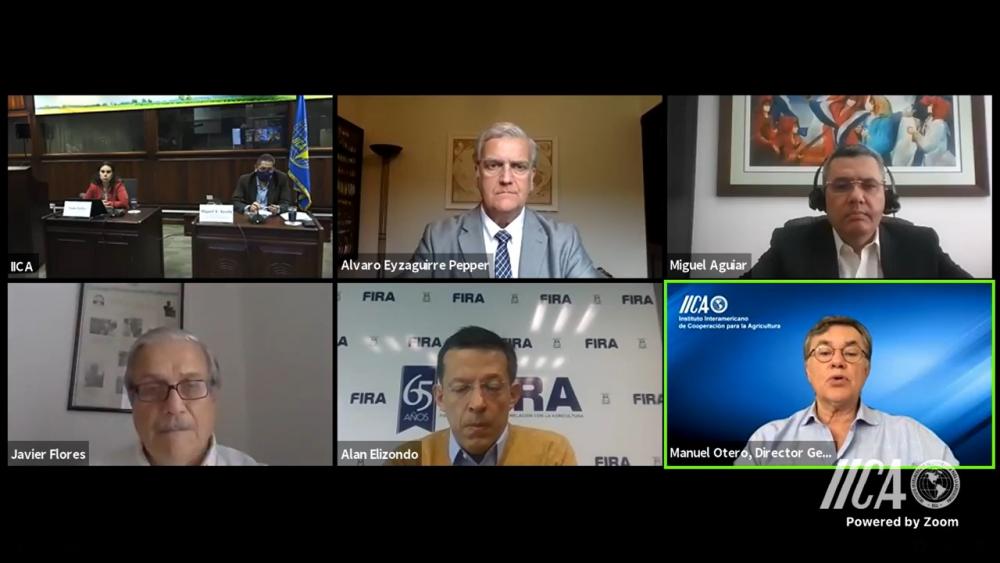An IICA-organized forum discussed best practices in these three countries to provide funding for the agriculture and rural sector – a sector that will be a mainstay for post-pandemic recovery.

San Jose, 30 September 2020 (IICA). The experiences of Chilean, Costa Rican and Mexican financial institutional with the agriculture and rural sector will serve as a guide for other countries in the Americas to implement similar initiatives to accelerate post-pandemic economic recovery, in a context in which agriculture will play a key role.
A virtual forum organized by the Inter-American Institute for Cooperation on Agriculture (IICA) addressed the modernization of agricultural innovation institutions in Chile, which is being undertaken through the country’s Foundation for Agricultural Innovation (FIA); the rural credit system that is being implemented by Costa Rica’s System of Development Banks (SBD), as well as measures by Mexico’s Trust Funds for Agricultural Development (FIRA) to spur the reactivation of the agrifood sector.
FIA, for example, has introduced financial incentives, information management, training and linkages to innovation networks to enable key stakeholders in the Chilean agriculture sector to spearhead innovative production processes; develop differentiated and high-quality products; and to gain access to new markets.
This has impacted areas such as the olive oil, European hazelnut, berry and truffle chains, among others, as well as research on animal genetics and precision agriculture.
Álvaro Eyzaguirre, Director General of FIA, reflected that, “Agriculture faces major challenges at this time, such as the need to tackle the grave financial crisis and to feed a growing population, while reducing its impact on the environment. Innovation provides a solution for all of these challenges, while adding value and increasing competitiveness”.
The SBD in Costa Rica is a group of 99 entities with a common objective that has become a tool for micro, small and medium-scale enterprises in all sectors of the economy to access financing, with a view to also increasing the competitiveness of the production sector.
Miguel Aguiar, Executive Director of the SBD, explained that 40% of the resources available for loans is earmarked for the agriculture sector and at least 25% of it is for micro-enterprises. Since its establishment in 2008, 52% of SBD’s resources have been used for initiatives in the agriculture sector.
Aguiar said that, “We are seeking to facilitate access to funding for production and production transformation processes, as well as to foster the coordination and integration of small farmers with other entities in the country, to enable them to develop new processes, products and markets and to add value”.
He mentioned that, with IICA’s support, his organization is working on programs to improve the productivity of cocoa plantations and to strengthen the livestock sector.
“At SBD, we look at support for production in the context of economic recovery; and in that context, rural territories and the rural sector play a pivotal role in generating employment and ensuring the well-being of people”, said Aguiar.
On the other hand, the experience of FIRA in Mexico focuses on assessing the value of environmental and social considerations in financial analysis, using methodologies based on risks, impact and the adoption of mitigation measures, which allows them to provide financial solutions for the agriculture sector and to drive environmentally and financially sustainable development models.
“The current time and the need for economic recovery is a call to action”, stressed Jesús Alan Elizondo, Director General of FIRA. “In Mexico, in normal times, these institutions help to correct market failures, such as in the area of financial inclusion; to spark innovation; to increase productivity and to promote sustainability. However, most important is their role in economic recovery, when these entities must facilitate and provide stability for the flow of resources, as an essential aspect of maintaining agricultural activity”.
Manuel Otero, Director General of IICA, also participated in the forum, emphasizing that the post-Covid-19 economic recovery of the Americas would require countries to combine efforts, foster horizontal cooperation and to institute agile and innovative financial mechanisms.
He maintained that, “The recovery will require that countries make an unprecedented financial effort to try to at least regain the level of well-being that we enjoyed before the pandemic. Funding will be a key component that should be achieved through agile and innovative mechanisms that are accessible to the various actors who require support to overcome the effects of the pandemic and to contribute to reactivating the agriculture sector in the coming years”.
Video only spanish
More information:
Kenneth Solano, Project Management and Agribusiness Specialist, IICA.
kenneth.solano@iica.int











